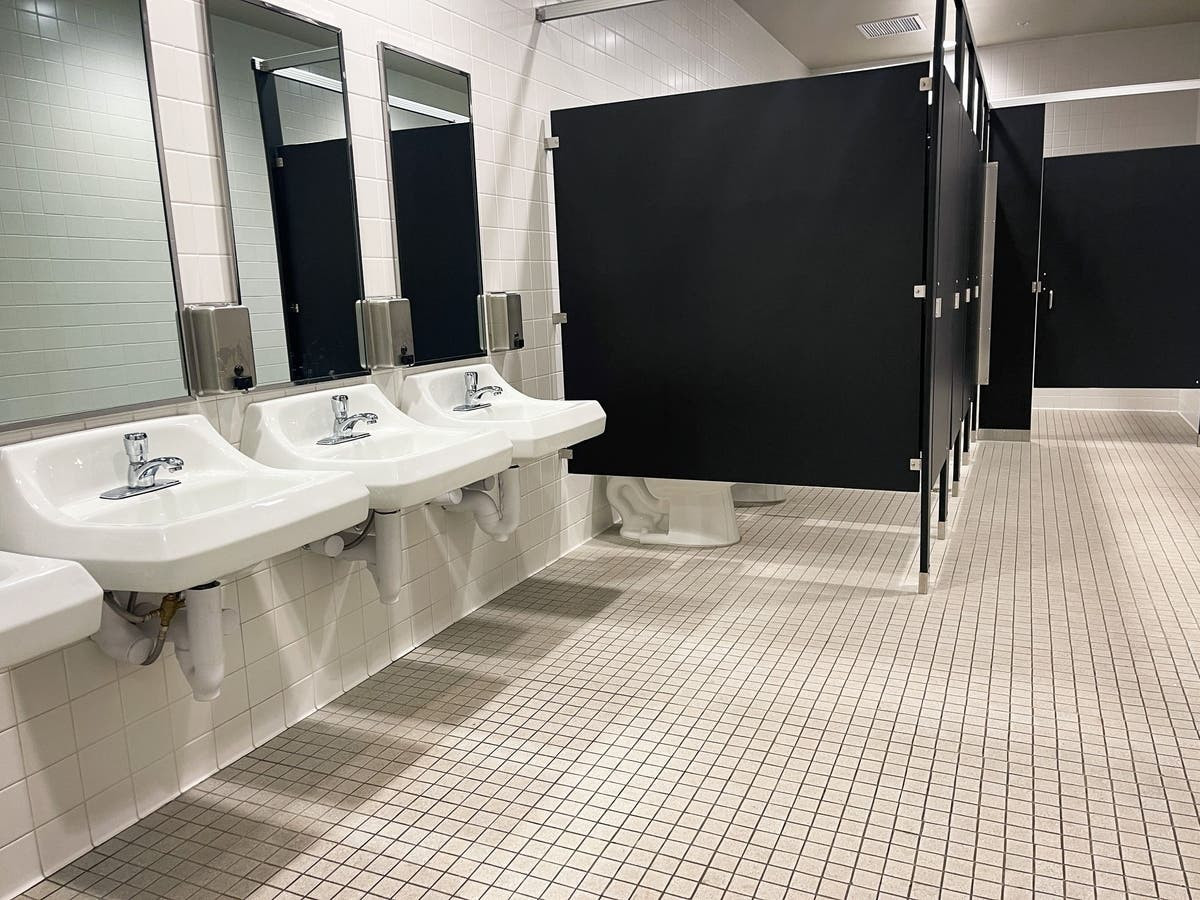A mom complained about a bathroom rule in her daughter's math class. Here's what experts say.
It's not unusual for school bathroom policies to make their way into the news.
More than a few schools across the United States, for instance, made headlines as they grappled with how best to accommodate transgender students and restroom use. In another case, a Northern California school found itself in the spotlight for locking bathrooms altogether in response to student safety concerns.
Now, the school bathroom policy debate has taken another turn. The mom of a school student recently took to X (formerly known as Twitter) to vent about her child's teacher limiting bathroom use. The same teacher apparently also rewards students with academic extra credit for refraining from using the bathroom altogether.
The tweet has since gone viral, garnering 16 million views and more than 283,000 likes. It also triggered significant debate, some 14,000 comments, from those for and against strict bathroom policies in schools.
Here's a closer look at the concerns on both sides of this polarizing issue and what experts have to say about how bathroom policies can potentially impact schoolchildren mentally and physically.
The tweet at the heart of the current bathroom debate was posted by an X user named "Seets," who wrote: "My daughter's math teacher has a rule that they only get one bathroom pass per week, AND, if they don't use it, they get academic extra credit. I am livid. But my daughter is mad that I want to email the teacher and CC the principal. Am I wrong here?"
Seets did not indicate where her daughter goes to school, the type of school it is, or what grade her child is in. The user also didn't respond to Parents request for comment by the time of publication. Still, a long list of X users responded to the tweet and waded into the debate.
Many X users expressed support for this mom, explaining why they too felt the policy is problematic. The reasons ranged from the potential health ramifications of holding one's bladder too long to the disproportionate impact, such a policy might have on those with health issues. There were also comments about the message such a policy sends to schoolchildren about the sort of behavior that is rewarded by teachers.
The Rationale for Restrictive Bathroom Policies
A few X users who described themselves as teachers offered support for the mother's frustrations but also explained the possible rationale behind these types of policies. One high school teacher who goes by the name Iowa Viewer on X, wrote: "This is wrong. It’s immoral, unethical, discriminatory, and extremely worrisome. Does your daughter attend a school where hall-wandering & elopement are an issue? That might be the teacher’s concern, BUT grades should be decided purely on academics."
Others pointed out that there's nothing at all wrong with the policy—given that students can easily go to the bathroom in between classes or at lunch time, and may just be using the break for things like vaping or dodging class. "Once they are in class the focus needs to be on instruction and learning," wrote X user Todd_Magers.
This isn't the first time social media comments about bathroom policies at schools have garnered attention. TikTokers who say they are teachers have shared videos explaining why they may be necessary, and others have voiced concerns, such as how strict policies can cause anxiety in students. There's a lot to unpack.
What Experts Say
When asked about the bathroom policy in question, Child psychologists supported the use of rules surrounding restroom visits in school settings. But in many cases, drew the line when it came to the severity of the policy described on X.
"Placing limits on the use of the bathroom in general is a reasonable practice for schools to help control students’ movements and actions while in school and ensure that children are engaged in learning," says Emma Woodward, PhD, a psychologist with the Child Mind Institute, a clinical care practice focused on children's mental health.
However, Dr. Woodward adds, "Limits for bathroom breaks are effective and reasonable when the limit is placed on how the children use the bathroom, instead of if they can use the bathroom." She suggests it would be more appropriate to limit the amount of time students can be out of the classroom when using the bathroom, rather than curtailing the total number of restroom visits.
"Children cannot control the physical needs of their body, so placing limits implying that they can decide they don’t need to use the bathroom is unrealistic," adds Dr. Woodward.
Potential Negative Impact
Adelphi University professor of psychology Lea A. Theodore, PhD, who has more than two decades of experience working with children and adolescents, has a variety of concerns about the policy in question, as well. "The issue regarding bathroom use in schools is extremely problematic on many levels, most saliently, from an ethical perspective," says Dr. Theodore.
She points out these policies can also result in overall health-related issues, such as bladder or urinary tract infections. Research shows holding urine for too long can weaken your bladder muscles and increase the risk of a bladder infection.
What's more, such extreme and adverse circumscribed rules may impede children's learning, suggests Dr. Theodore. Children, she explains, may fear leaving the classroom due to perceived repercussions. And this reality may preclude those who may be ill or have special education needs from using restrooms as needed, which may result in increased anxiety.
Teacher Perspectives and School Policies
Because the school was not identified in the X user's post about the bathroom policy, it was not possible to obtain comment from school representatives.
When contacted for comment, the National Education Association (NEA) said it did not have an expert available to speak on the topic, adding that the organization does not have a policy on such matters. Similarly, the American Federation of Teachers declined to comment.
But a 2018 survey from the Society for Women’s Health Research found most schools don’t have a written student bathroom policy, but teachers restrict bathroom access for several reasons. The top reasons include students misbehaving in the bathroom, leaving the classroom without actually needing to use the restroom, and having enough time to use the bathroom on break.
Kellie Kopach, a seventh grade teacher at Deer Path Middle School, in Lake Forest, Illinois, tells Parents that, in general, policies surrounding bathroom use are necessary at schools. In most cases, they help prevent too much socializing and potential misbehavior. "It is important to have some kind of policy in place to reinforce school behavior expectations," explains Kopach, who has two decades of experience working in the classroom.
But like child psychologists, Kopach feels that limiting how many times children use a restroom can be too restrictive.
"The policy at my school is that students must have a bathroom pass and must use the bathroom one at a time," explains Kopach. "However, they are not limited to an amount of bathroom visits."
Kopach also points out, "I have never heard of a school using the aforementioned policy, but most schools have a policy to prevent too many students using the washroom at one time. This helps ensure the safety of all students.”
These comments were echoed by Matthew Murphy, a longtime educator, who taught at the elementary school level in New Jersey, before serving as principal at Berkeley Elementary School in Woodward, New Jersey. He then became a superintendent at River Vale School Township District and Ramsey School District, both also in New Jersey.
"As a former superintendent, I’ve implemented and reviewed various academic policies that balance student accountability with their well-being," says Murphy, who now serves as a consultant. "Restrictive policies like limited bathroom passes can have unintended consequences, particularly on student health, comfort, and concentration in class."
All of these factors, Murphy adds, deeply influence student performance and well-being, which is critical for educators to keep in mind when designing such policies.
What Can Parents Do?
In such a fraught situation, it can be hard for parents or students to know how best to respond.
Gilly Kahn, PhD, a clinical psychologist specializing in work with neurodivergent kids and teens, suggests varying approaches based on a child's age. For older students, such as those in high school, Dr. Kahn says parents should grant the child more autonomy in deciding how to address the issue.
"For teens who say they do not want their parents to email administrators, I would, as a parent, assess how much the policy is interfering with their child's well-being and academic performance," says Dr. Kahn. "Parents may also choose to reach out to the teacher to ask about the policy and whether the teacher believes it is affecting their child."
If the child is of elementary or middle school age, it can be wise for the parent to contact the school principal or another administrator to discuss any concerns.
Children of any age, however, should be taught self-advocacy skills (if they are able to advocate for themselves). "So, if they, themselves, think that a school policy is unfair, they have the language and the knowledge of who to go to,” says Dr. Kahn. “This can be taught through a simple proactive discussion with your child."
For a child in special education who has what's known as an individualized education plan (IEP) stating that they must be able to use the facilities at any time, the plan must legally be followed as it is a legal document, shares Dr. Theodore.
Similarly, if a child has a Section 504 Plan in place (which requires classroom teachers or school staff to provide certain types of accommodations), teachers are required to follow the plan guidelines, adds Dr. Theodore.
"The bottom line is that using the bathroom in schools is not a privilege, it is a necessity," says Dr. Theodore. "Using a bathroom is not a reward system."
Conclusion: A Balancing Act
The debate over school bathroom policies is a complex one, with valid arguments on both sides. While teachers need to maintain order and ensure a safe learning environment, it's crucial to prioritize student health and well-being. Restrictive policies can have unintended consequences, potentially impacting student health, academic performance, and mental well-being. Open communication between parents, teachers, and school administrators is essential to finding a balance that works for everyone.

















